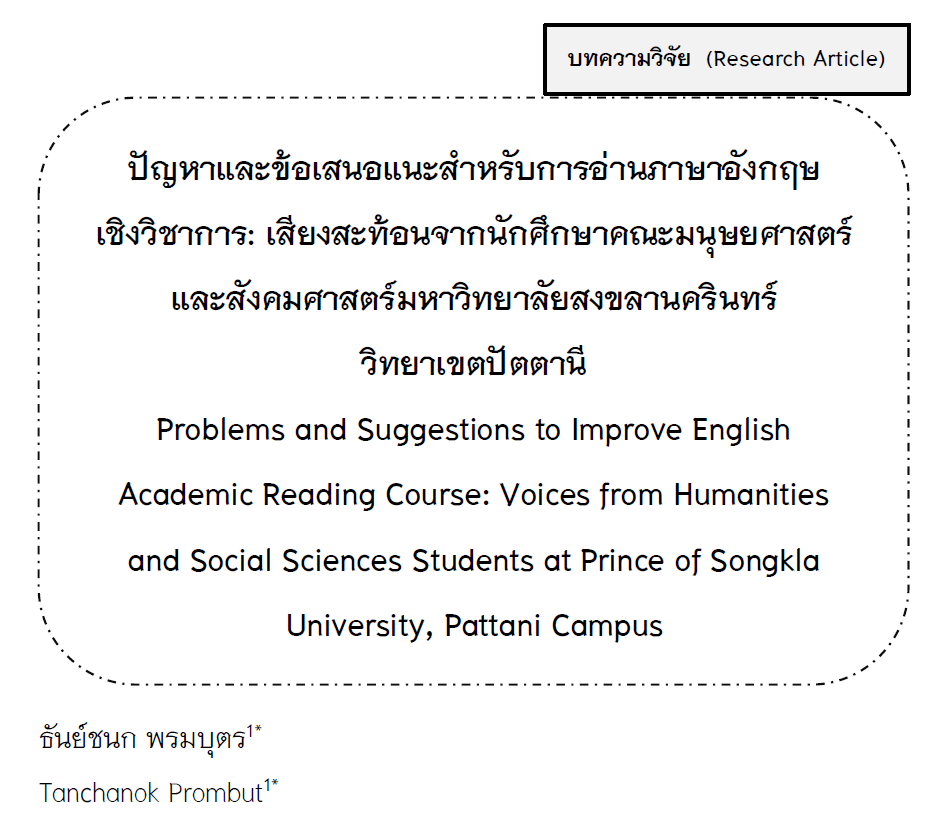ปัญหาและข้อเสนอแนะสำหรับการอ่านภาษาอังกฤษ เชิงวิชาการ: เสียงสะท้อนจากนักศึกษาคณะมนุษยศาสตร์และสังคมศาสตร์มหาวิทยาลัยสงขลานครินทร์ วิทยาเขตปัตตานี
คำสำคัญ:
ปัญหาการอ่านภาษาอังกฤษ , ผู้เรียนภาษาอังกฤษชาวไทย , เสียงสะท้อนและคำแนะนำจากผู้เรียน, การอ่านภาษาอังกฤษเชิงวิชาการบทคัดย่อ
งานวิจัยนี้มีวัตถุประสงค์หลัก 2 ประการ 1) เพื่อศึกษาปัญหาที่มีต่อการอ่านภาษาอังกฤษเชิงวิชาการของนักศึกษาคณะมนุษยศาสตร์และสังคมศาสตร์ มหาวิทยาลัยสงขลานครินทร์วิทยาเขตปัตตานี และ 2) เพื่อสำรวจข้อคิดเห็นและข้อเสนอแนะของนักศึกษาที่มีต่อปัญหาการอ่านภาษาอังกฤษเชิงวิชาการ การวิจัยครั้งนี้มีกลุ่มตัวอย่างจำนวน 103 คน เก็บข้อมูลจาก 2 แหล่งข้อมูล 1) แบบสอบถาม 78 คน และ 2) การสัมภาษณ์เชิงลึก 25 คน การวิเคราะห์ข้อมูลเชิงสถิติที่ได้จากแบบสอบถามโดยใช้วิธีหาค่าเฉลี่ยและส่วนเบี่ยงเบนมาตรฐาน พบว่า นักศึกษาคาดหวังให้มีการเพิ่มการเรียนการสอนเนื้อหารายวิชาภาษาอังกฤษมากขึ้น (= 3.62, SD= 0.78) นักศึกษาไม่เข้าใจโครงสร้างไวยากรณ์ภาษาอังกฤษ (= 3.49, SD = 0.81) สมรรถนะในการสอนของอาจารย์มีผลกับความต้องการในการเรียนภาษาอังกฤษของนักศึกษา (= 3.42, SD = 0.80) และนักศึกษาส่วนใหญ่ไม่เข้าใจเนื้อหาภาษาอังกฤษที่อ่าน (= 3.29, SD = 0.73) นอกจากนี้ การวิเคราะห์ข้อมูลที่ได้จากการสัมภาษณ์เชิงลึกแสดงให้เห็นว่า นักศึกษาส่วนใหญ่ยอมรับว่า ไม่ชอบและไม่มั่นใจในการเรียนภาษาอังกฤษ อย่างไรก็ตาม นักศึกษาตระหนักถึงความสำคัญของภาษาอังกฤษและต้องการที่จะเรียนภาษาอังกฤษมากขึ้น รวมถึงแนะนำให้ผู้สอนเน้นการจัดกิจกรรมการเรียนรู้ที่หลากหลายมากกว่าการสอนบรรยายเพียงอย่างเดียว
งานวิจัยนี้มีความแตกต่างจากงานวิจัยอื่น ๆ ตรงที่งานวิจัยนี้เน้นการสำรวจปัญหาและความต้องการของผู้เรียน และเนื่องจากภูมิหลังของประชากรส่วนใหญ่เป็นประชากรในจังหวัดชายแดนภาคใต้ซึ่งมีปัจจัยที่อาจส่งผลต่อผลสัมฤทธิ์ทางการเรียนภาษาอังกฤษ ดังนั้นการสะท้อนปัญหาและความต้องการของผู้เรียนกลุ่มนี้จะทำให้ทราบถึงสาเหตุและที่มาของปัญหา รวมทั้งเป็นแนวทางในการจัดการเรียนการสอนที่ส่งเสริมศักยภาพในการอ่านภาษาอังกฤษเชิงวิชาการของผู้เรียนได้ตรงจุดและมีประสิทธิภาพมากขึ้น
เอกสารอ้างอิง
Aegpongpaow, O. (2008). A qualitative investigation of metacognitive strategies in Thai students’ English academic reading. (Unpublished master's thesis). Bangkok: Srinakharinwirot University.
Akkakoson, S., & Setobol, B. (2009). Thai EFL students’ use of strategies in reading English texts. The Journal of KMUTNB, 19(3), 329-342.
Almalki, S. (2016). Integrating Quantitative and Qualitative Data in Mixed Methods Research--Challenges and Benefits. Journal of education and learning, 5(3), 288-296.
Anuyahong, B. (2012). A study of English reading strategies and reading motivation used by Thai-Nichi institute of technology students. International Conference on Business and Industrial Research (ICBIR 2012) Thai-Nichi Institute of Technology (171-176). Bangkok.
Boonkongsaen, N., Sujinpram, N., & Verapreyagoon, J. (2016). English reading strategies used by Thai students with different English exposures from different educational Institutions. ABAC Journal, 36(1), 47-67.
Chomchaiya, C., & Dunworth, K. (2008). Identification of learning barriers affecting English reading comprehension instruction, as perceived by ESL undergraduates in Thailand. Proceedings of the EDU-COM International Conference (96-104). Perth, Western Australia: Edith Cowan University.
Chomphuchart, N. (2007). A cognitive-based study of Thai EFL graduate students' reading strategy use. Journal of English Studies, 3, 50-84.
Degang, M. (2010). Motivation toward English language learning of the second year undergraduate Thai students majoring in Business English at an English-medium university. (Unpublished MA thesis). Bangkok: Srinakharinwirot University.
Dewey, M., & Jenkins, J. (2010). English as a Lingua Franca in the Global Context: Interconnectedness, Variation and Change. In M. Saxena, & T. Omonivi (Eds.), Contending with Globalization in World Englishes. Multilingual Matters, 72-86.
Hayikaleng, N., Nair, S. M., & Krishnasamy, H. N. (2016). Thai students’ motivation on English reading comprehension. International journal of education and research, 4(6), 477-486.
Kasemsap, B., & Lee, H. Y. H. (2015). L2 reading in Thailand: Vocational college students’ application of reading strategies to their reading of English texts. The Reading Matrix: An International Online Journal, 15(2), 101-117.
Knapp, K. (2015). English as an international lingua franca and the teaching of intercultural communication. Journal of English as a Lingua Franca, 4(1), 173-189.
Liangpanit, C. (2018). What are the need and problems of English reading for Thai graduate students. Sripatum Chonburi Journal, 14(3), 26-37.
Mauranen, A. (2015). English as a global Lingua Franca: Changing language in changing global academia. In Exploring ELF in Japanese academic and business contexts (29-46). Routledge.
Ninsuwan, P. (2015). The effectiveness of teaching English by using reading aloud technique towards EFL beginners. Procedia-Social and Behavioral Sciences, 197, 1835-1840.
Peregoy, S. F., & Boyle, O. F. (2000). English learners reading English: What we know, what we need to know. Theory into practice, 39(4), 237-247.
Sitthitikul, P. (2010). Curriculum context analysis to support meaningful EFL reading in Thailand. Journal of Studies in the English Language, 5.
Smokotin, V. M., Alekseyenko, A. S., & Petrova, G. I. (2014). The phenomenon of linguistic globalization: English as the global lingua franca (EGLF). Procedia-Social and Behavioral Sciences, 154, 509-513.
Srikrai, P. S., Lin, D., Lakaisone, S., & Sirinthorn, S. (2016). English Language Difficulties of Non-NativeEnglish Postgraduate Students in an English for Academic Purposes at a Thai University. Proceedings of CLaSIC (301–315).
Thamajaree, T., & Sa-ngiamwibool, A. (2014, May). An Investigation of Thai High School Students’ English Language Learning Problems. In International Conference on Education and Language (ICEL).
Thongwichit, N. (2018). Reading in English: What Problems do Students Face in the South of Thailand?. Humanities, Arts and Social Sciences Studies, 18(1), 75-89.

ดาวน์โหลด
เผยแพร่แล้ว
รูปแบบการอ้างอิง
ฉบับ
ประเภทบทความ
สัญญาอนุญาต
ลิขสิทธิ์ (c) 2024 มหาวิทยาลัยพะเยา

อนุญาตภายใต้เงื่อนไข Creative Commons Attribution-NonCommercial-NoDerivatives 4.0 International License.
ผู้นิพนธ์ต้องรับผิดชอบข้อความในบทนิพนธ์ของตน มหาวิทยาลัยพะเยาไม่จำเป็นต้องเห็นด้วยกับบทความที่ตีพิมพ์เสมอไป ผู้สนใจสามารถคัดลอก และนำไปใช้ได้ แต่จะต้องขออนุมัติเจ้าของ และได้รับการอนุมัติเป็นลายลักษณ์อักษรก่อน พร้อมกับมีการอ้างอิงและกล่าวคำขอบคุณให้ถูกต้องด้วย
The authors are themselves responsible for their contents. Signed articles may not always reflect the opinion of University of Phayao. The articles can be reproduced and reprinted, provided that permission is given by the authors and acknowledgement must be given.







